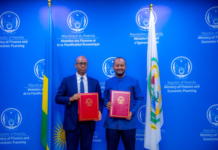In a significant move to bolster Tanzania’s poultry industry, the Ministry of Livestock and Fisheries has partnered with the Netherlands Embassy to launch a comprehensive initiative aimed at improving poultry disease diagnosis and management.
This collaboration seeks to modernize disease control mechanisms through knowledge exchange and the adoption of advanced technologies, thereby enhancing livestock trade and ensuring national food security.
At the launch event in Dar es Salaam, Professor Riziki Shemdoe, Permanent Secretary in the Ministry of Livestock and Fisheries, emphasized the transformative potential of this partnership. He highlighted that the Tanzania Veterinary Laboratory Authority (TVLA) will play a pivotal role in implementing the project, which marks a milestone in bilateral cooperation between Tanzania and the Netherlands.
The initiative prioritizes the adoption of cutting-edge laboratory diagnostics and technologies to enhance disease identification and management. Professor Shemdoe noted that improved diagnostics will bolster poultry health and increase sector productivity, ultimately sustaining Tanzania’s growing poultry industry.
He also underscored the economic potential of poultry farming in creating employment opportunities, particularly for young people. This aligns with the government’s commitment under President Samia Suluhu Hassan’s leadership, exemplified by the 28.1 billion Tanzanian shilling national livestock vaccination campaign.
Encouraging youth participation in agribusiness, Professor Shemdoe urged engagement in the Building a Better Tomorrow (BBT) program, which promotes sustainable employment through poultry farming and related ventures.
Ambassador Wiebe de Boer of the Kingdom of the Netherlands commended the collaboration, highlighting the Netherlands Enterprise Agency’s financial support and TVLA’s partnership with Royal GD, a Dutch leader in animal health diagnostics. He lauded the Ministry of Livestock and Fisheries for its dedication but stressed the need for continued efforts to ensure the project’s long-term success.
Ambassador de Boer also highlighted Royal GD’s expertise, noting its capacity to conduct up to five million laboratory analyses annually for global clients. He emphasized the importance of reinforcing TVLA’s diagnostic capabilities and pointed to the Memorandum of Understanding (MoU) formalizing the partnership as a key step in strengthening poultry health.
The ambassador further recalled a visit by two Dutch delegations in September, comprising representatives from 11 leading poultry companies. The visit facilitated specialized training and business-to-business engagements, fostering stronger ties between Tanzanian and Dutch poultry stakeholders.
Robert Molenaar, an expert from Royal GD, underscored the vital role of poultry in sustainable farming and social well-being. He noted that the Netherlands, the world’s second-largest agricultural exporter after the United States, has succeeded through extensive investment in farming technology. This expertise, he added, can be leveraged to advance Tanzania’s poultry industry.
Dr. Mfaume Simbah, a veterinary scientist and technical manager at Silverlands Tanzania, shed light on the challenges faced by smallholder poultry farmers. He noted that many farmers struggle with proper vaccine usage and water management during vaccinations. Additionally, the misuse of antimicrobials during vaccination periods complicates disease control efforts.
Dr. Simbah stressed that smallholder poultry farming is essential for food security and rural livelihoods, particularly in low- and middle-income countries. However, infectious diseases and gaps in vaccination knowledge remain significant obstacles.
Through this initiative, Tanzanian farmers will gain access to better diagnostic tools, targeted training, and improved disease management strategies, strengthening the poultry sector and enhancing domestic and international trade.
In a related development, the Ministry of Livestock and Fisheries, in collaboration with the Netherlands Embassy and key industry players, has introduced a new poultry curriculum assessment project aimed at enhancing sector efficiency.
Dr. Stella Bitanyi, CEO of TVLA, emphasized the project’s role in reshaping poultry farming across the country, focusing on increasing productivity and supporting farmers. The poultry sector holds significant importance in Tanzania’s agricultural landscape, with 96 percent of livestock farmers raising indigenous chickens in small-scale operations.
However, these farms, typically with fewer than 20 birds, account for less than 20 percent of the nation’s total poultry meat and egg production. Despite the sector’s potential, it has faced slow growth, with production expanding at only 2.6 percent annually, and egg production remaining below 2.5 billion eggs per year, reflecting a modest per capita consumption rate of one egg per person each week.
The curriculum assessment project aims to shift farming practices from informal and traditional methods to more structured and sustainable approaches, supporting youth employment and empowering women, given poultry farming’s role in economic participation for these groups.
This multifaceted collaboration between Tanzania and the Netherlands represents a significant step toward modernizing the poultry sector, addressing critical challenges, and unlocking economic opportunities for farmers nationwide.








